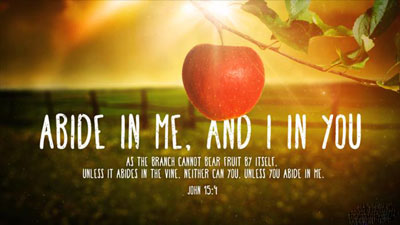
1. This is the fifth of the seven weeks of Eastertide, and the second of four weeks exploring Jesus’ teachings about living in intimacy with God.
2. Jesus is in the midst of what’s sometimes called his “farewell discourse” to the disciples, who are understandably distraught (John 14-17). Here was the Messiah, the one they’d hoped would deliver them and the whole world, the one for whom they’d given up so much — and now he’s leaving? For all these reasons and more, the disciples are disoriented, unnerved, and afraid; Thomas’ wide-eyed, anxious question speaks for the group: “How can we know the way?”
3. Jesus is engaged here in urgent pastoral care, assuring his companions that his imminent departure is not abandonment, but rather will make way for an even deeper intimacy. It’s as if he is saying: “Yes, I’m about to leave; but on a deeper level, I’ll still be with you, even closer than before. Don’t worry — trust me!”
What’s coming, Jesus promises, isn’t distance but rather a radical closeness, a companionship so intimate as to blur any sharp distinction between the companions. Branches and vines aren’t identical, of course, but they do share a common life, a kind of symbiosis.
What would such mutual indwelling look like in practice? In a word, it would look like love: incarnate, tangible, down-to-earth, intertwining, intersecting, growing, fruitful, vibrant love.
4. Like last week’s image of the “good shepherd,” this week’s image of “the vine” would have been familiar to many early followers of Jesus: Isaiah, Ezekiel, and the Psalms each make use of it. Here again, Jesus’ teachings are grounded in the Jewish scriptural, poetic imagination.
5. Jesus makes seven “I am” statements in John’s Gospel (“I am the bread of life,” “I am the light of the world,” and so on), each of which evokes the name of God in Exodus 3:14, “I am who I am” or “I will be who I will be.” This week’s passage — “I am the vine” — is the seventh and last such statement.
6. In Acts, the larger theme around and underneath this week’s passage is the Jesus movement opening up also to include Gentiles (that is, non-Jews as well as Jews). The Ethiopian eunuch, while a prestigious figure in a foreign royal court, is nonetheless an outsider. As a Gentile whose status as a eunuch meant he traditionally could not become a Jew (see, e.g., Leviticus 21:20), his conversion foreshadows Cornelius’ conversion (Acts 10-11), which in turn inaugurates the official Christian mission to the Gentiles.
7. The Gospel seeks to dismantle such barriers, extending its circle beyond the “in-group” to embrace those on the outside, the lost and left-behind. . In verse 3, the Greek word translated “cleansed” may also be glossed, “pruned” — a rich metaphor for any gardener. Pruning means cutting away for the sake of new and greater growth, more fruit, more abundance, more life. Thus Jesus takes up and transforms the ancient prophetic image of God cutting away and burning portions of the vineyard, reframing it in terms of helping the garden to grow and thrive.
